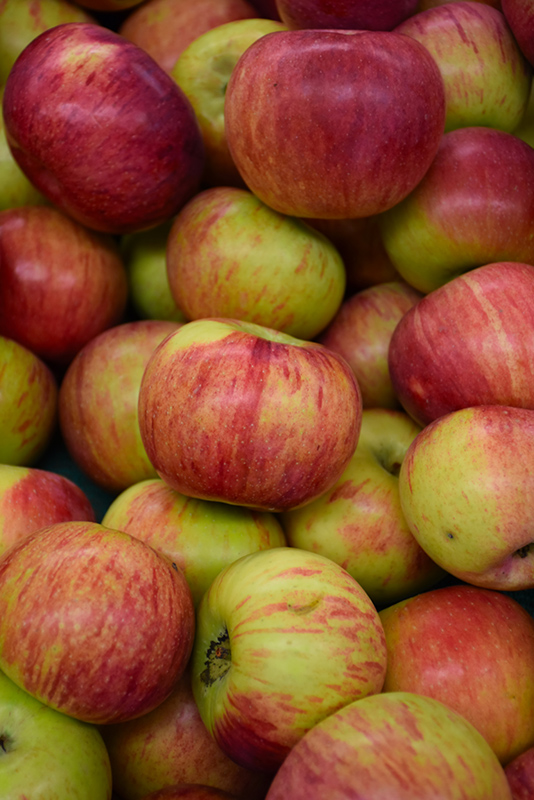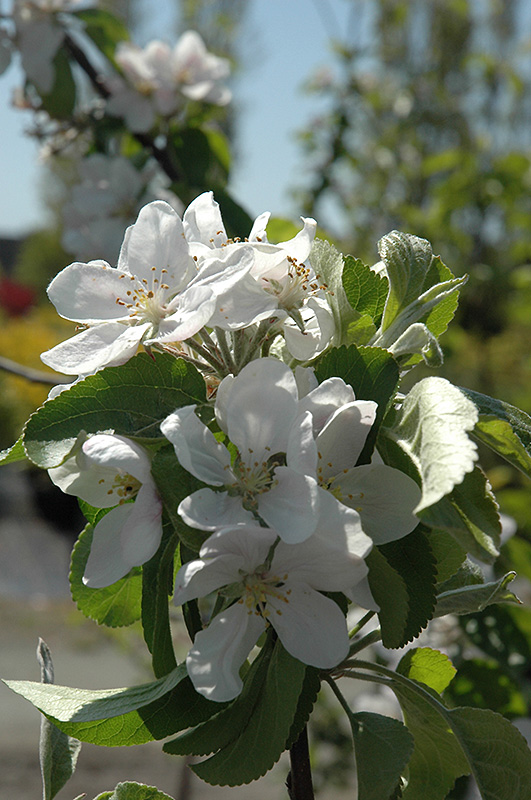Plant Finder
Height: 20 feet
Spread: 20 feet
Sunlight:
![]()
Hardiness Zone: 5
Description:
A popular red-striped apple with excellent flavor, keeps very well, late harvest; eating apples are high maintenance and need a second pollinator; the perfect combination of accent and fruit tree, needs well-drained soil and full sun
Edible Qualities
Cortland Apple is a small tree that is typically grown for its edible qualities. It produces chartreuse round apples (which are botanically known as 'pomes') with cherry red stripes and white flesh which are usually ready for picking from early to mid fall. The apples have a delicious taste and a crisp texture.
The apples are most often used in the following ways:
- Fresh Eating
- Cooking
- Juice-Making
Features & Attributes
Cortland Apple features showy clusters of lightly-scented white flowers with shell pink overtones along the branches in mid spring, which emerge from distinctive pink flower buds. It has forest green deciduous foliage. The pointy leaves turn yellow in fall. The fruits are showy chartreuse apples with cherry red stripes, which are carried in abundance in mid fall. The fruit can be messy if allowed to drop on the lawn or walkways, and may require occasional clean-up.
This is a deciduous tree with a more or less rounded form. Its average texture blends into the landscape, but can be balanced by one or two finer or coarser trees or shrubs for an effective composition. This is a high maintenance plant that will require regular care and upkeep, and is best pruned in late winter once the threat of extreme cold has passed. Gardeners should be aware of the following characteristic(s) that may warrant special consideration;
- Messy
- Disease
Aside from its primary use as an edible, Cortland Apple is sutiable for the following landscape applications;
- Accent
- Shade
- Orchard/Edible Landscaping
Planting & Growing
Cortland Apple will grow to be about 20 feet tall at maturity, with a spread of 20 feet. It has a low canopy with a typical clearance of 4 feet from the ground, and is suitable for planting under power lines. It grows at a medium rate, and under ideal conditions can be expected to live for 50 years or more. This variety requires a different selection of the same species growing nearby in order to set fruit.
This tree is typically grown in a designated area of the yard because of its mature size and spread. It should only be grown in full sunlight. It prefers to grow in average to moist conditions, and shouldn't be allowed to dry out. It is not particular as to soil type or pH. It is highly tolerant of urban pollution and will even thrive in inner city environments. This particular variety is an interspecific hybrid.
Disclaimer - Rutgers Landscape & Nursery Plant Finder is an online resource representing many of the varieties that we carry over the course of the season, and is intended for informational purposes only. Inventory varies seasonally, so we cannot guarantee that every plant will be in stock at all times - please contact Rutgers directly for current availability.


